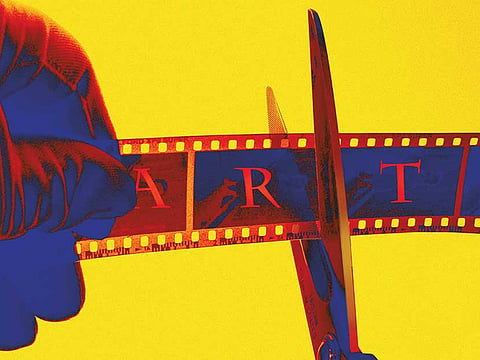Focus: Censoring creativity
Would censorship eventually end up destroying the fabric of the nation?

Politically motivated
Politicians should not dictate creative expression
The censor board of India has shown its double standards by demanding 89 cuts initially in the upcoming Bollywood film, ‘Udta Punjab’. The movie is based on drug addiction in the state of Punjab in India. When, in Indian movies, Goa is often depicted as a hub for drugs, and Haryana is shown as a place where there are many cases of rape and abortion, what is wrong with revealing the realities of Punjab? This is the same censor board that has passed movies like ‘Housefull’, ‘Hamshakals’ and so on, without cutting out idiotic double entendres. But at the end of the day, it’s not just about ‘Udta Punjab’. Whenever the censor board in India takes such action, it seems to be for politically inspired movies, films based on real-life events or historic moments — basically movies that break the stereotype. In this case, I am convinced that the film is taking on the very important topic of drug addiction. As a pharmacist, I have read, heard and seen how easily people can become addicted to various forms of drugs. At least here in the UAE, we have controls in place, but in India, even full control schedule H drugs (prescription drugs) are sold over the counter. It is high time that the censor board of India is reformed, so that a few sensible people, with knowledge of cinema and its impact on society, are elected. Censorship should not be imposed on the creative expression of ideas. Instead, it should take into account any form of art, which might create communal tension or chaos in society. Politicians want to control the way certain states or events are depicted, so that they can control the narrative. This is unjust and incorrect. It will lead to film directors and producers rethinking whether they want to make a movie in the future, on such serious and important topics. The hassle of releasing such movies would impact them.
From Mr Abdul Mujaheed, Executive pharmacist based in Dubai
Independent thought
The audience is ready to face reality
The recent controversy regarding the release of ‘Udta Punjab’ brings to light a very irrational move from the Indian censor board. As most people know, this is not the first time that the Central Board for Film Certification (CBFC) has shown sheer injustice to Indian filmmakers.
After four years of extensive research, writer and director Abhishek Chaubey made ‘Udta Punjab’, a film that exposes the bitter side of India. Since drug abuse is a prominent issue among India’s youth in certain areas, bringing it to light in this form would have a positive impact on society. But CBFC’s response to the movie was quite hypocritical, when it suggested 89 cuts, including rumours of cutting down references of Punjab.
How is it logically possible to cut down references of Punjab, when it was used several times throughout the film, and the movie itself was set in Punjab? How is it possible to remove all scenes of injecting drugs, when the whole movie is about the menace caused by its usage? It seems that in such cases, the censor board wants an entire remake of the film. This act shows utter disrespect towards a filmmakers’ efforts to bring about a significant change in society. After all, without all these aspects, how would the film seem realistic to viewers?
One thing we all have to keep in mind is that today’s audience is ready to see movies exactly the way they were made, and face reality, however harsh it might be. When the movie is already rated for adults, who can think independently, the idea of censoring it proves to be baseless. When all that should be censored is prevalent in society for everyone to see, what is the point of censoring it on screen?
From Ms Parvathi Sreeraj, Grade 10 student at The Indian High School, Dubai
Expression
Allow meaningful films to flourish
Art is meant to reflect real life like a mirror, and so, it should be taken in the right spirit. Indian art and film, especially, is known for its vibrant depiction of culture, tradition and values. Censoring films is important only when violence, sexually explicit scenes and other aspects directly affect a country’s reputation. When freedom of speech and expression are not going to affect the way a country is perceived, the film should not be disturbed. The Indian censor board is an organisation that considers the sensitivities of the nation, and it should deal with films carefully and respect the work of the film industry. If the movie’s subject has a social or moral message, or is educational and informative, any censor board would be expected to encourage such movies, as these would be of national interest. If the story lines and dialogues do not hurt the sentiments of people from any particular religion, the movie must be allowed to be screened. Clashes between politicians and filmmakers should be avoided, in the interest of society. On the other hand, filmmakers should also maintain proper ethics, by ensuring there is limited vulgarity in the films they screen. But when they make meaningful movies that depict reality, such films should not be mangled by the censor board. Due to incorrect judgments, individuals can end up facing both monetary loss and a damaged reputation. ‘Unbiased and meaningful’ should be the code of censor boards around the world. After all the backlash, I hope, in the coming days, the Indian censor board will function more effectively.
From Mr K. Ragavan, Retired executive based in Bengaluru, India
Sign up for the Daily Briefing
Get the latest news and updates straight to your inbox


